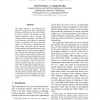Free Online Productivity Tools
i2Speak
i2Symbol
i2OCR
iTex2Img
iWeb2Print
iWeb2Shot
i2Type
iPdf2Split
iPdf2Merge
i2Bopomofo
i2Arabic
i2Style
i2Image
i2PDF
iLatex2Rtf
Sci2ools
102
click to vote
EMNLP
2008
2008
Bayesian Unsupervised Topic Segmentation
This paper describes a novel Bayesian approach to unsupervised topic segmentation. Unsupervised systems for this task are driven by lexical cohesion: the tendency of wellformed segments to induce a compact and consistent lexical distribution. We show that lexical cohesion can be placed in a Bayesian context by modeling the words in each topic segment as draws from a multinomial language model associated with the segment; maximizing the observation likelihood in such a model yields a lexically-cohesive segmentation. This contrasts with previous approaches, which relied on hand-crafted cohesion metrics. The Bayesian framework provides a principled way to incorporate additional features such as cue phrases, a powerful indicator of discourse structure that has not been previously used in unsupervised segmentation systems. Our model yields consistent improvements over an array of state-of-the-art systems on both text and speech datasets. We also show that both an entropy-based analysis and...
EMNLP 2008 | Lexical Cohesion | Model Yields | Natural Language Processing | Unsupervised Topic Segmentation |
Related Content
| Added | 29 Oct 2010 |
| Updated | 29 Oct 2010 |
| Type | Conference |
| Year | 2008 |
| Where | EMNLP |
| Authors | Jacob Eisenstein, Regina Barzilay |
Comments (0)

